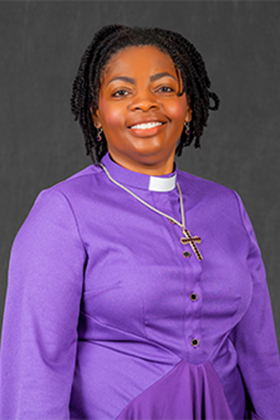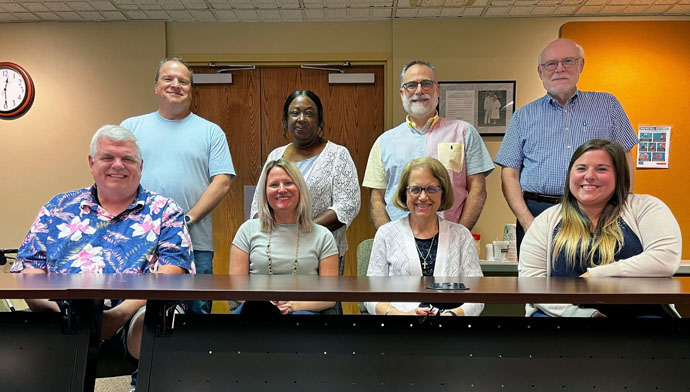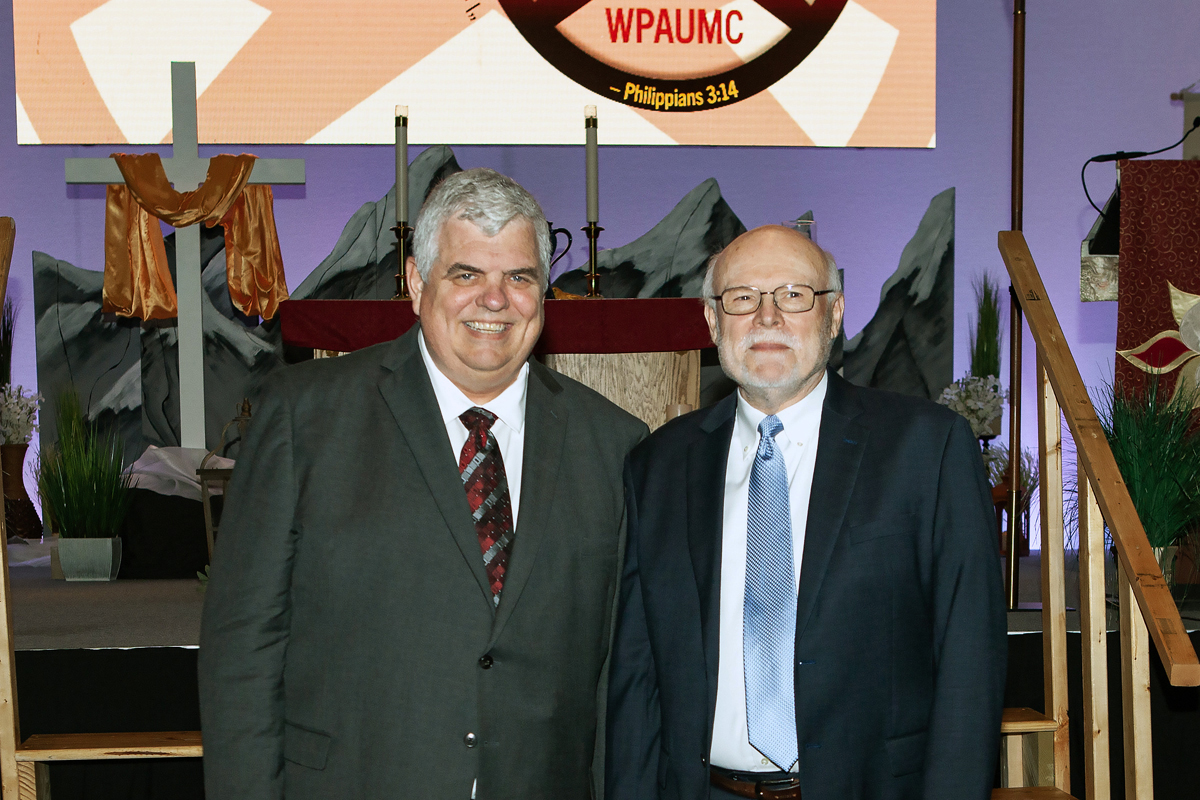Key Points:
- Tracy Merrick is a theological progressive within the Western Pennsylvania Conference, and the Rev. Bob Zilhaver is a traditionalist there.
- Merrick and Zilhaver have worked closely together on conference matters for more than 20 years.
- They have recently been part of the conference’s Intentional Missional Alignment Process Task Force, an effort to create progressive, traditional and blended “households” for churches and clergy to be part of.
Tracy Merrick and the Rev. Bob Zilhaver have been an odd couple in the Western Pennsylvania Conference for so long that they no longer seem so odd.
Merrick, 75, is a layman and a progressive, strong for full LGBTQ inclusion in The United Methodist Church.
Zilhaver, 61, is a traditionalist district superintendent who supports the denomination’s bans on same-sex weddings and ordination of self-avowed practicing homosexuals.
But the two have worked side by side for more than 20 years on conference and denominational matters, serving on committees, task forces and delegations, co-sponsoring legislation and keeping communication channels open between different theological camps.

Photo courtesy of the Western Pennsylvania Conference.
“Tracy and Bob are the epitome of iron sharpening iron,” said Western Pennsylvania Bishop Cynthia Moore-Koikoi. “When the two of them work together on something, we are always the better for their collaboration.”
Schism isn’t stopping them. Indeed, this season of widespread conflict and disaffiliation in The United Methodist Church has seen Merrick and Zilhaver sticking to the high road, working together for as much unity as possible.
Their specific project has been to join a handful of others in fleshing out a new organizational structure for their conference, one aimed at creating safe spaces for remaining clergy and churches of different theological perspectives — specifically on LGBTQ inclusion.
The plan’s prospects are uncertain, and no one can question that this is, in Western Pennsylvania and across the United States, a fraught time for the United Methodist connection.
But the Merrick-Zilhaver connection remains strong.
“I appreciate Bob enormously,” Merrick said. “I’m grateful for the partnership that God has opened up with him.”
Said Zilhaver: “There’s been hard conversations, but the relationship that we have together, our work together in Jesus Christ, has overcome that.”
The two were brought together in the aftermath of the 2000 General Conference in Cleveland.
For decades, General Conference — the denomination’s quadrennial law-making assembly — has seen conflict over homosexuality, but the Cleveland meeting included especially disruptive protests that resulted in arrests.
After the Cleveland gathering, the Western Pennsylvania Conference — which was to host the 2004 General Conference in Pittsburgh — created a dialogue team consisting of some of its progressive and traditionalist leaders.
Merrick and Zilhaver were part of that. While Zilhaver remembers “hard” talks in the early going, Merrick goes farther.
“There were evenings when we had absolutely brutal conversations,” he said. “Bob and I were two that exchanged some very brutal comments.”
Merrick was born in Syracuse, New York, but grew up in Meadville, Pennsylvania. A cradle Methodist, he majored in math at Oberlin College and earned a master’s in the school of management at Vanderbilt University. He returned to Western Pennsylvania and began a long career in banking, eventually holding a senior technology management position for PNC Financial.
When PNC absorbed another bank, Merrick was the guy who made sure new customers got their bank statements and ATM cards. He also oversaw his PNC’s Y2K plan.
Merrick began in early adulthood to serve The United Methodist Church at the local church, conference and general church levels, often bringing his financial expertise to bear. He’s a five-time General Conference delegate and twice was an alternate.
His views on LGBTQ inclusion in the church were conservative until one day in 1982 when a letter arrived from his brother, sharing that he was coming out as gay.
“I knew absolutely, immediately, that something had to change, and it wasn’t my brother,” Merrick said.
It was a 10-year process, but Merrick became a forceful advocate for full LGBTQ inclusion in The United Methodist Church. He would, as well, become a leader in progressive caucuses, namely the Methodist Federation for Social Action and Reconciling Ministries Network.
Zilhaver grew up in Clarion, Pennsylvania, attending First United Methodist Church there. He went to Virginia Military Institute on an ROTC Scholarship.
While at VMI, he felt a call to ministry under unusual circumstances: watching the Bill Murray war comedy “Stripes.”
“There’s not much godly in that movie, but somehow God used it,” Zilhaver said.
Answering the call took a while. Zilhaver spent 10 years in the Army, winning a Bronze Star in Desert Storm, a Meritorious Service Medal in Somalia and retiring as a major before entering seminary and beginning his Western Pennsylvania Conference ministry. He was a longtime local church pastor. Since 2017, he has been superintendent of his conference’s Connellsville District.
Subscribe to our
e-newsletter
Zilhaver is an unapologetic traditionalist, and has led the singing at traditionalist Wesleyan Covenant Association gatherings. But he’s also a board member of the United Methodist Commission on the Status and Role of Women and founded a Western Pennsylvania AIDS ministry.
Zilhaver is a five-time General Conference delegate and has written briefs and argued cases in Judicial Council matters. He’s been influenced by a range of theologians and makes a point of reading Dante’s “Divine Comedy” every year.
While many traditionalists are leaving The United Methodist Church, Zilhaver is sticking it out.
“I’m choosing to be in The United Methodist Church because God is not finished with me yet here,” he said on a WCA podcast earlier this year.
For Zilhaver, “getting past the stereotypes” was the challenge for the dialogue team he and Merrick were part of beginning in 2002.
Progressives felt they’d been summed up as believing anything goes in human sexuality, when in reality they championed long-term, monogamous relationships for all couples, gay or straight. Traditionalists felt they were reflexively accused of homophobia for supporting the church’s long understanding that marriage is to be between a man and a woman.
Zilhaver and Merrick say the dialogue team had a rough beginning but made progress after getting a facilitator, the Rev. Sandra Marsh-McClain.
She insisted on one topic at a time and allowed interruptions only for questions of clarification.
“We had to stop and listen to one another,” Zilhaver said.
Merrick said, “There were so many ‘aha’ moments when we actually started listening.”
A bond had begun to form between Merrick and Zilhaver and it strengthened when they collaborated on planning a worship during the 2004 General Conference in Pittsburgh.
The service was meant to model cooperation between United Methodists of different perspectives. But decisions about the wording of the liturgy, and whether a traditionalist or progressive bishop would speak first, required delicate negotiations.
The service came off more or less as planned, and Zilhaver and Merrick emerged closer.
“When you actually do things together, they become part of who you are, and your history,” Zilhaver said.
Merrick and Zilhaver have, through the years, felt comfortable picking up the phone every few weeks and sounding one another out about conference matters and where traditionalists and progressives stand.
Others in the conference noticed that the men share an interest in and patience for working with complicated issues of United Methodist polity.
“Bob and Tracy both are legislatively astute, having authored numerous petitions and resolutions through the years,” said the Rev. Alyce Weaver Dunn, the Western Pennsylvania Conference’s director of connectional ministries. “Both are process thinkers and have the ability to approach projects in a systematic way.”
Merrick and Zilhaver were part of the Western Pennsylvania Conference’s Actively Waiting Task Force that Moore-Koikoi formed after the pandemic postponed General Conference 2020. Zilhaver lobbied to have Merrick included.
The task force ultimately proposed, and the Western Pennsylvania Conference last year approved, legislation creating the Intentional Missional Alignment Process — better known as IMAP.
IMAP is an effort to foster unity and harmony in the conference while acknowledging and respecting differences. It calls for the creation of three theological “households” — progressive, traditional and blended — that churches and clergy align with, while still remaining part of the conference.
“It’s kind of like ‘Harry Potter,’” Zilhaver said. “You have your houses, but you all eat at the same dining room table.”
Said Merrick, “We really are saying we’re committed to encouraging all communities of faith to see where it is that God is leading them.”

This past year, Merrick and Zilhaver were part of the eight-member IMAP task force, charged with developing a detailed plan and implementation schedule.
Mallory Miles co-chairs that task force and asked Merrick and Zilhaver for help in drafting the legislation laying out IMAP specifics.
“We actually spent a few hours one afternoon really getting that legislative language down,” she said. “It was great and encouraging to work with them. They were both excited about what we were doing.”
But the Western Pennsylvania Conference chose on June 16 to table rather than approve the latest IMAP legislation, meaning any going forward with the households plan is on hold for at least a year.
The conference had earlier that week approved the disaffiliation of 298 churches — more than a third of the conference total.
“What I heard (from conference members) was, ‘We’re going through grief as an annual conference and to do something new at this point would not be helpful,’” Dunn said.
Merrick and Zilhaver acknowledge their own grief over the disaffiliations, and disappointment that IMAP got put on hold. For Zilhaver, who has overseen 47 local church disaffiliations in his district, the toll appears to have been physical as well.
He had a first ever experience with atrial fibrillation during the annual conference, sending him to the hospital.
“My wife said, basically, ‘Your heart stopped because of the church. It’s not an accident,’” Zilhaver said. “This last year to 18 months has probably been the hardest I’ve had, which includes military combat. It’s just stressful and sad.”
But the IMAP Task force is going to keep meeting, and Zilhaver and Merrick will be with them.
The two co-sponsored a pair of successful petitions at the last annual conference, aimed at having The United Methodist Church and Western Pennsylvania Conference move toward building working relationships with the denominations where disaffiliating churches are landing.
Meanwhile, their own partnership still feels solid.
“We know each other well enough that we can authentically be who we are,” Merrick said.
Said Zilhaver, “I would never ask Tracy to do something that is against his convictions, but there are a lot of things we hold in common. And we can build on those.”
Hodges is a Dallas-based writer for United Methodist News. Contact him at 615-742-5470 or newsdesk@umcom.org. To read more United Methodist news, subscribe to the free Daily or Weekly Digests.



